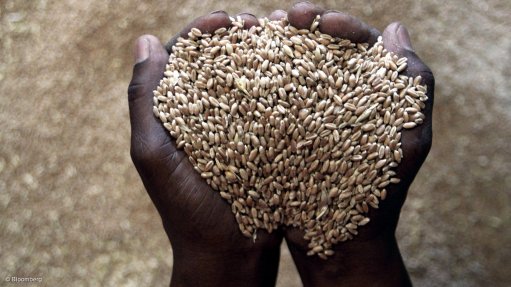It is not all doom and gloom for agriculture
This article has been supplied as a media statement and is not written by Creamer Media. It may be available only for a limited time on this website.
Company Announcement - Despite the severe drought currently facing the agricultural industry, FNB remains optimistic about the financial well-being of its farming clients. According to Dawie Maree, Head of Information and Marketing at FNB Business Agriculture, the true severity of the current drought will only be realised in the coming year. The optimal planting period for some Mpumalanga maize producers has passed and indications are that only 75 - 80% of the planting has been completed. Following the fair rain last week, most of this region should be able to complete planting, in land that has already been prepared.
The North West region and western parts of the Free State still have time to plant. If these areas receive good rains within the next month, with follow-up rain later during the production cycle, farmers could still harvest a reasonable crop. “However, if dry conditions persist, the outlook for an average to good crop will undoubtedly deteriorate. FNB continuously consults with various industry experts to get an indication of possible changes in weather patterns and planting conditions in order to proactively assist clients,” says Maree.
Recent reports of a sharp decline in the price of meat must also be viewed in context. While there is downward pressure on the weaner calf price due to oversupply in the market, this has not yet filtered through the supply chain in order to benefit consumers,” says Maree, adding that the oversupply in the weaner calf market resulted from farmers off-loading more livestock due to the dry conditions. He says that in the long run the situation will normalise and farmers who are able to hold out now will benefit from higher prices at a later stage when the market experiences shortages in supply. Once grazing conditions improve, farmers will rebuild their herds and curtail the supply of animals to the market.
Consumers should take advantage of possible lower prices now, as they are bound to increase in future. In addition, export producers have benefitted from the weakening of the Rand and those farmers who would have soft grain commodities available for sale from previous seasons, will benefit from expected higher local price levels. This might offset the impact of a possible lower crop for the current production season.
Although the previous droughts did not have that much impact on consumers, this time the situation may be quite different. Middle class consumers are also feeling the pinch as a result of water-restrictions and more so due to the heat-wave conditions experienced over the last couple of weeks. Maree says the current drought conditions are affecting the whole economy. The South African Reserve Bank increased the repo-rate by 25 basis points last week, partly on the back of increased food price inflation expectations, a direct result of the drought conditions experienced in most parts of the country. The increase in interest rates will add more pressure on the disposable income of consumers, resulting in lower demand for luxury agricultural products.
As a result, the impact will be felt much wider than just the agricultural sector. He says the drought may also have socio-economic consequences. Job creation in the agricultural and related manufacturing sectors will slow down should the dry conditions continue into 2016.
Despite the anticipated impact of the drought, FNB is not overly concerned about a substantial increase in farmers who may not be able to meet commitments. Our book is very healthy, well diversified and many farmers have the ability to increase gearing levels slightly. This will enable the bank to review individual needs on merit with the view to possibly restructure or refinance facilities of farmers in need.
“We believe that our agricultural client base and our relationship team have proven themselves as superior and we remain totally committed to the industry. Our “through-the-cycle” credit extension policy will enable us to assist most of our farming clients despite one or two below average seasons. We have been involved in agriculture for longer than 175 years, have invested substantially in both the primary and secondary agriculture sectors and will continue to do so within the current regulatory credit environment,” concludes Maree.
Comments
Press Office
Announcements
What's On
Subscribe to improve your user experience...
Option 1 (equivalent of R125 a month):
Receive a weekly copy of Creamer Media's Engineering News & Mining Weekly magazine
(print copy for those in South Africa and e-magazine for those outside of South Africa)
Receive daily email newsletters
Access to full search results
Access archive of magazine back copies
Access to Projects in Progress
Access to ONE Research Report of your choice in PDF format
Option 2 (equivalent of R375 a month):
All benefits from Option 1
PLUS
Access to Creamer Media's Research Channel Africa for ALL Research Reports, in PDF format, on various industrial and mining sectors
including Electricity; Water; Energy Transition; Hydrogen; Roads, Rail and Ports; Coal; Gold; Platinum; Battery Metals; etc.
Already a subscriber?
Forgotten your password?
Receive weekly copy of Creamer Media's Engineering News & Mining Weekly magazine (print copy for those in South Africa and e-magazine for those outside of South Africa)
➕
Recieve daily email newsletters
➕
Access to full search results
➕
Access archive of magazine back copies
➕
Access to Projects in Progress
➕
Access to ONE Research Report of your choice in PDF format
RESEARCH CHANNEL AFRICA
R4500 (equivalent of R375 a month)
SUBSCRIBEAll benefits from Option 1
➕
Access to Creamer Media's Research Channel Africa for ALL Research Reports on various industrial and mining sectors, in PDF format, including on:
Electricity
➕
Water
➕
Energy Transition
➕
Hydrogen
➕
Roads, Rail and Ports
➕
Coal
➕
Gold
➕
Platinum
➕
Battery Metals
➕
etc.
Receive all benefits from Option 1 or Option 2 delivered to numerous people at your company
➕
Multiple User names and Passwords for simultaneous log-ins
➕
Intranet integration access to all in your organisation


















